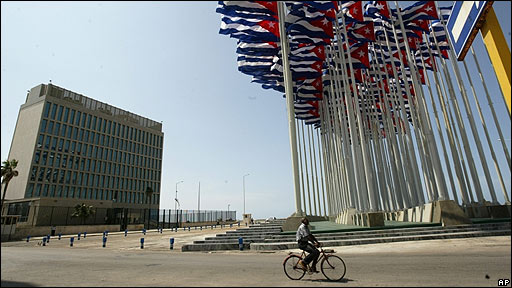
Hard-liners’ edifice complex
Last week, we stuck our necks out.
We asked Members of Congress who support the opening with Cuba — and the companies which stand to benefit from it — to make their positions clear about the legislative riders cantering through the Appropriations Committee that seek to shut down new flights and new ferry services to the island.
Whoa Nellie. That seemed to be too much for Capitol Hill Cubans which, after calling us deceptive, dishonest, and alarmist, still agreed with our bottom line that President Obama could head them off at the pass with a wave of his veto pen.
That would suit the 64% of Americans nationally, 56% of Latinos, a majority of Cuban Americans, and 97% of Cubans who agree with us and not them.
These policies are popular. Okay: Sticking our necks out? Not so much.
The next piece of the diplomatic breakthrough with Cuba — opening full-flown embassies in Washington and Havana for the first time since 1961 — will fall into place next week.
After that, it will be time for both countries to put ambassadors into those embassies so they can represent their respective national interests accordingly.
Senators are supposed to consider nominations by the President for ambassadorial positions. That comes with the job description (see the Constitution).
If you had heard members of the Foreign Relations Committee last month, when several Senators waxed elegiac about our diplomats and Foreign Service officers who work overseas, you’d think this should not be an issue.
Senator Ben Cardin (MD), the Committee’s senior Democrat, said “American diplomats and development professionals are the best examples of talented people that are on the front line for America.”
Not to be outdone, Senator Bob Menendez (NJ), the Committee’s former senior Democrat added, “I think they are the unsung heroes of national security and national interest promotion for our country, and recognizing them is incredibly important.”
And they are right: supporting our diplomats and their missions overseas is important. Of course, as with the travel riders, there’s a hitch.
Opponents of the President’s new policy have already pledged to block any ambassadorial appointment.
For example, Senator Marco Rubio (FL), a Member of the Foreign Relations Committee, has said, “I anticipate we’re going to have a very interesting couple of years discussing how you’re going to get an ambassador nominated.”
Senator Bob Menendez (who praised the unsung heroes), also says “it would be very difficult to get an ambassador confirmed.”
Even Senator Cardin, on the Foreign Relations Committee and a champion of the President’s policy, says “I don’t think it’s useful to confront a situation that may not have a successful completion.”
That’s apparently Senate lingo for “Mr. President, if you’re thinking about nominating an ambassador to Cuba, don’t waste your time.”
What about Senator Jeff Flake, who has argued, as Politico reports, that “as more Americans travel to Cuba, it is essential that the U.S. have an ambassador there, if only to give added assurances that the rights of U.S. citizens will be fully protected.”
He must think if the President nominated a U.S. ambassador to Cuba, even his opponents would insist that our country be fully represented, right? He says, “I don’t think they’ll be persuaded,” even though, “we’re better off having an ambassador.”
Unfortunately, the “Advise and Dissent” crowd also wants to starve the new embassy of the funds it needs to make the building fully operational. Senator Lindsey Graham said that soon after the U.S.-Cuba diplomatic breakthrough occurred in December. Senator Rubio holds that position still.
In the short-term, their edifice complex will not stand in the way of progress. Since the State Department is not asking for funds to convert our Interest Section in Havana into an embassy, no budget rider can stop that from taking place.
This is not, however, the end of the story. When the “brand new” U.S. embassy throws open its doors as early as next week, its insides will show its age. Last year, an Inspector General report found our Interest Section in Havana had offices that lacked equipment and supplies, insufficient resources to repair buildings, and our diplomatic team was short-staffed in the face of a crushing workload (thanks, in part, to Cuba’s decision to remove restrictions on the right of its citizens to travel overseas and return).
It’s a shame that Congress cannot be expected to approve more money to maintain and upgrade our embassy in Havana. But, that cannot be blamed on hardliner politics alone.
The U.S. Congress has not renewed the State Department’s authorization for thirteen years. By contrast, as Senator Jeanne Shaheen (NH) noted in April, the Congress has enacted new authority for the Defense Department for every one of the last 51 years.
Soon, it will be our diplomats in Havana — not our military — ushering in this new era of U.S.-Cuba relations. Congress must do its job, so they have the ambassador and fully functional embassy they need to do theirs.
(From: CDA)


